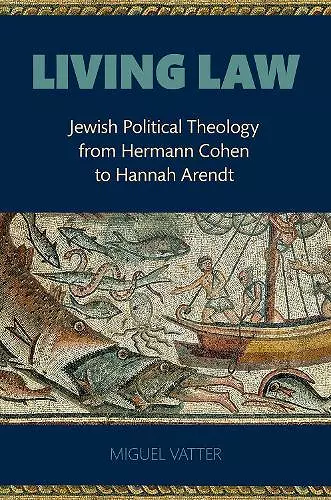Living Law
Jewish Political Theology from Hermann Cohen to Hannah Arendt
Format:Hardback
Publisher:Oxford University Press Inc
Published:31st Mar '21
Currently unavailable, and unfortunately no date known when it will be back

It is often assumed that modern democratic government has a special link with Christianity or was made possible due to Christianity. As a challenge to this belief and echoing a long-held assumption in the republican tradition, Hannah Arendt once remarked that "Washington's and Napoleon's heroes were named Moses and David." In this book, Miguel Vatter reconstructs the political theology of German Jewish philosophers during the twentieth century and their attempts to bring together the Biblical teachings on politics with the Greek and Roman traditions of political philosophy. Developed alongside modern experiences with anti-Semitism, the rise of Zionism, and the return of charismatic authority in mass societies, Jewish political theology in the twentieth century advances the radical hypothesis that the messianic idea of God's Kingdom correlates with a post-sovereignty, anarchist political condition of non-domination. Importantly, Jewish philosophers combined this messianic form of democracy with the ideal of cosmopolitan constitutionalism, which is itself based on the identity of divine law and natural law. This book examines the paradoxical unity of anarchy and rule of law in the democratic political theology developed by Hermann Cohen, Franz Rosenzweig, Gershom Scholem, Leo Strauss, and Hannah Arendt. Critical of the Christian theological underpinnings of modern representative political institutions, this group of highly original thinkers took up the banner of Philo's project to unify Greek philosophy with Judaism, and rejected the separation between faith and reason, as well as the division between Biblical revelation and pagan philosophy. The Jewish political theology they developed stands for the idea that human redemption is inseparable from the redemption of nature. Living Law offers an alternative genealogy of political theology that challenges the widespread belief that modern republican political thought is derived from Christian sources.
Ingenious and original. * Michael Zank, The Review of Politics *
An erudite and comprehensive work that finally offers an account of Jewish political theology in distinctive and refreshing ways. Vatter's thought moves both historically and conceptually with great care and precision. Through a wide range of sources and in light of heterodox Jewish religious and philosophical writings, he argues that Jewish political theology is wrought from textual, conceptual, and mystical traditions. The ideas of divine sovereignty and divine governments offer another path toward understanding political theology, departing from Schmitt and contextualizing his contributions in light of a substantial legacy of Jewish political thought. * Judith Butler, author of Parting Ways: Jewishness and the Critique of Zionism *
Vatter's book is not merely about Jewish political theology, it is a bold and powerful intervention in the uniquely Jewish fusion of the ideas of divine sovereignty and individual human dignity. For Vatter, to put it simply, Jewish political theology expounds the biblical verse, 'Let us make the human in our image.' Vatter offers a profound and provocative meditation on the way that Jewish political thought, from Philo to Hannah Arendt, aspires to make this biblical verse into the first principle of a free people's democratic constitution. * Bruce Rosenstock, author of Transfinite Life: Oskar Goldberg and the Vitalist Imagination *
In this gripping work, Miguel Vatter traces the genesis of a distinctively Jewish political theology. Drawing on vast reserves of erudition, Vatter shows how the luminaries of German Jewish thought, from Cohen to Arendt, developed a notion of 'living law' directly opposed to the authoritarian tenor of political theology as practiced by Carl Schmitt. This careful historical work allows Vatter to advance a provocative theoretical claim: theocracy is not synonymous with clerical rule or religious coercion. Rather, in its German-Jewish incarnation, theocracy is radically democratic, modeling a form of political community that is anarchic without being lawless. * Julie E. Cooper, Tel Aviv University *
Living Law asks if there is such a thing as a Jewish political theory. In this superb book, Miguel Vatter's answer is that there is. Looking at a series of key Jewish political and theological thinkers, Vatter finds that the common thread to these figures is a sense of community that is independent, and even possibly resistant, to states and governments of various sorts. Living Law describes how the Jewish tradition contains inside itself a radical, anarchic kernel, a kind of material practice that permits both vast differences in thought and application even as it also holds that community together. If you want a book that really gets to the bottom of how a theological tradition can translate itself into a set of coherent albeit radically unlike practices, this is the book for you. * James Martel, San Francisco State University *
ISBN: 9780197546505
Dimensions: 236mm x 155mm x 31mm
Weight: 658g
360 pages